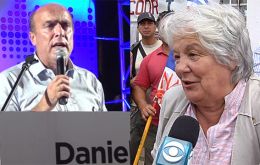MercoPress. South Atlantic News Agency
Tag: Daniel Martinez
-
Monday, July 1st 2019 - 09:59 UTC
Uruguay: No surprises in a primary with a record of candidates

In a primary election full of new faces and overshadowed by accusations of “dirty” campaigns, there were no surprises in the results of the internal elections of Uruguay's main political parties, according to the data of the pollsters. Daniel Martínez (Frente Amplio), Luis Lacalle Pou (National Party) and Ernesto Talvi (Colorado Party) will represent the three parties with the greatest adhesion in the country, starting a new stage in the national elections in October.
-
Monday, July 1st 2019 - 09:58 UTC
Uruguay presidential election campaign takes off, following on Sunday's party primaries

A former mayor of the city of Montevideo, and a Senator, head of the opposition are the most serious candidates to be elected the next Uruguayan president according to the results of the political parties' primaries held this Sunday. General elections in Uruguay are scheduled for the end of October, and a month later a runoff in case no candidate manages a 50% majority of votes cast.
-
Thursday, June 20th 2019 - 09:59 UTC
Uruguay holding presidential primaries on 30 June: three main candidates outstand

The last Sunday of June Uruguay will be holding presidential primaries when political parties will be choosing their candidates for the coming election scheduled for next October. There are over a dozen hopefuls, but only three, maybe four or five can be considered sufficiently strong as to be taken into account. After all from one of these parties will come the next president of Uruguay, since there is no consecutive reelection in Uruguay.
-
Friday, November 4th 2016 - 09:42 UTC
Rousseff in Uruguay declared “Illustrious visitor” of Montevideo and will speak at a political rally

Brazilian ex president Dilma Rousseff is in Uruguay, her first overseas visit since Congress voted her impeachment and removal from office. The leader is scheduled to participate on Friday in a march in downtown Montevideo with Uruguayan unions protesting salary conditions and will also be received at a special ceremony in the town hall where she will be given the keys of the city by mayor Daniel Martinez.
-
Monday, May 11th 2015 - 08:47 UTC
Uruguay's local elections: no major number surprises but interesting changes in the political map

Uruguay Sunday's department and municipal elections resulted mostly as forecasted with no major surprises, and as advanced by MP 9 May, in the capital Montevideo, with half the country's electorate, the two promising candidates have effectively been the elected mayor, Daniel Martinez and Edgardo Novick, a successful businessman and non political figure, who now becomes head of the opposition.
-
Saturday, May 9th 2015 - 10:21 UTC
On Sunday 2.6 million Uruguayans vote for their local authorities

On Sunday May 10, Uruguay is holding county and municipal elections with 2.6 million eligible voters (out of a population of 3.3m) in an event which will be more centered on local issues and thus will not necessarily replicate the absolute majority vote of the ruling coalition in last October/November presidential and legislative election.
